Introduction to the Problem
- “Me Too” movement – founded in 2006 by Tarana Burke;
- Shedding light on sexual violence and its broad impact;
- Transformed into a nation-wide dialogue;
- Finding ways to individual healing and disrupting the system that allowed violence to persist;
- “Empowerment through empathy” to help survivors of abuse (Murray, 2017, para. 1);
- Reached the mainstream media due to reports of abuse in the entertainment industry.
The popular hashtag ‘MeToo’ has been sweeping the global society in the aftermath of the infamous Harvey Weinstein scandal. While the movement was initially created in 2006, it has gained massive attention fairly recently due to the exposure of unethical and criminal actions of the most influential people in the entertainment industry. the purpose of this presentation is shedding light on the movement and evaluating it from a socio-psychological perspective.
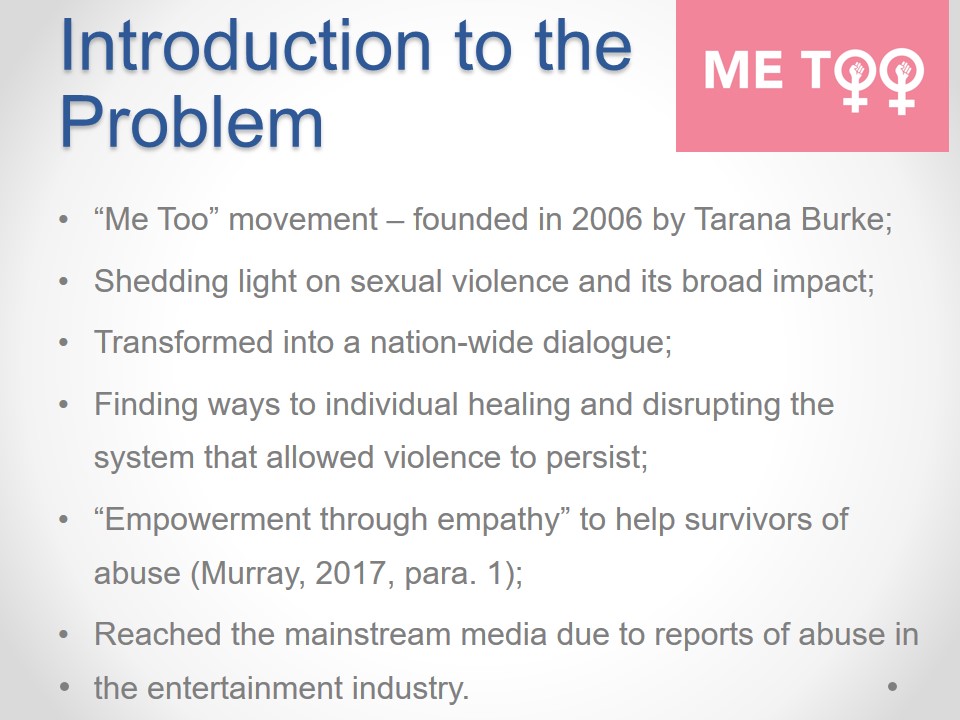
Role of Reciprocal Determinism
- Behavior: environment, individual qualities, and behavior itself (social and personal characteristics);
- Environmental component (physical surroundings, people, relationships) influences the intensity and frequency of behaviors;
- Personal qualities that were previously rewarded create a foundation for future behaviors;
- The introduction of reinforcing stimuli in the environment changes individuals’ behaviors (Nevid, 2013).
The topic of reciprocal determinism is relevant to the current discussion because it explains why people may act in specific ways. Experiences of sexual abuse and harassment have been subjected to stigma, which made it harder for victims to share their stories. This means that changes in the environment (both positive and negative) may influence the way in which survivors of sexual abuse approach their experiences. #MeToo is given the role of a reinforcing stimulus in the reciprocal determinism framework.
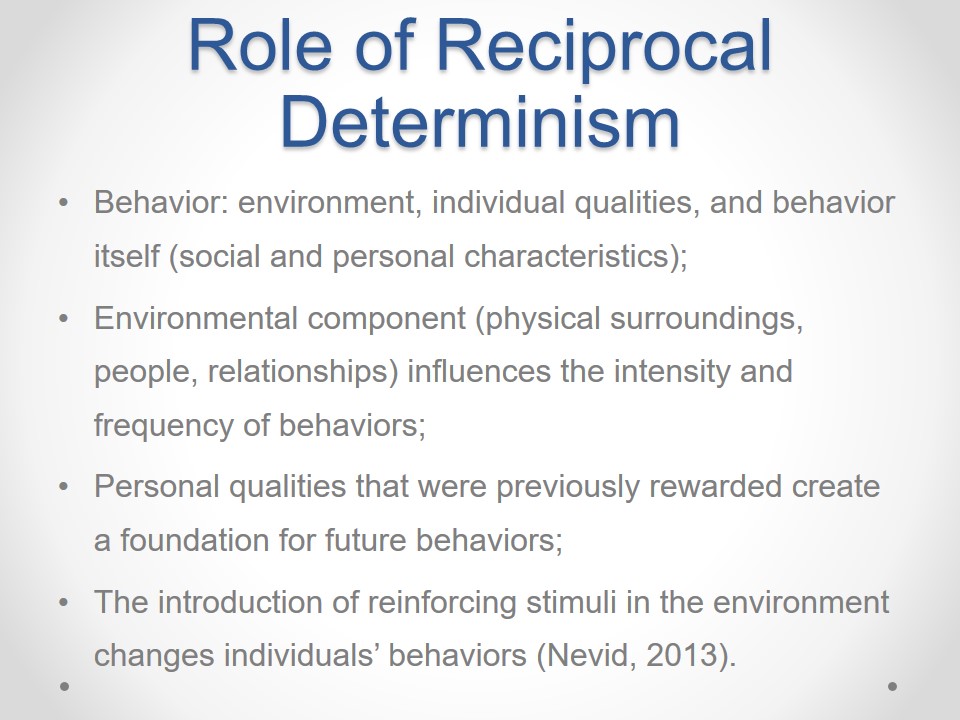
Psychology of #MeToo
- Reporting sexual abuse creates solidarity among victims;
- Feelings of isolation elevate when victims find others with similar experiences (Northeastern University, 2017);
- Individuals in disadvantaged situations have less power than their abusers;
- Opening a conversation about what should be done to restore the impact of sexual abuse;
- Undermining the structural inequality that has both physical and mental impact.
The psychological significance of #MeToo should not be undermined. Through creating a movement with a distinct name and purpose, Tarana Burke, the founder, alongside with her supporters are now able to develop a sense of solidarity among sexual assault victims that they have never experienced. They are no longer in isolation from the society but are included in the conversation about the adverse mental influence of sexual assault and harassment.
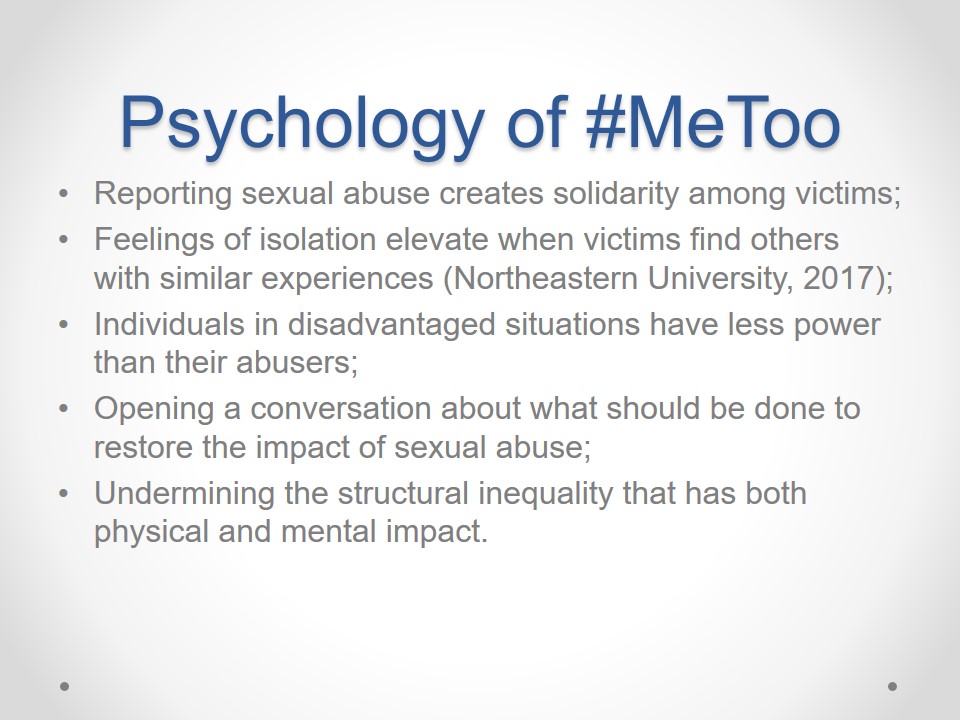
Reciprocal Determinism and #MeToo
- Victims of abuse were silent → because of the outdated social standards that stigmatized victims of sexual assault (Kennedy & Prock, 2016);
- Victims started sharing their experience → encouraged by the #MeToo movement;
- Solidarity among victims of assault → reinforced by the popularity of the movement;
- Examples of women in the entertainment industry → helping women realize that they are not alone.
In the context of reciprocal determinism, the #MeToo movement should be seen as a positive reinforcement that made it possible for victims of sexual abuse and harassment to change their previous behaviors. In the past, such people were left alone with their mental struggles because the environment did not allow them to speak freely. The shift toward the acceptance created a sense of solidarity, especially with the support from celebrities who also shared their stories.
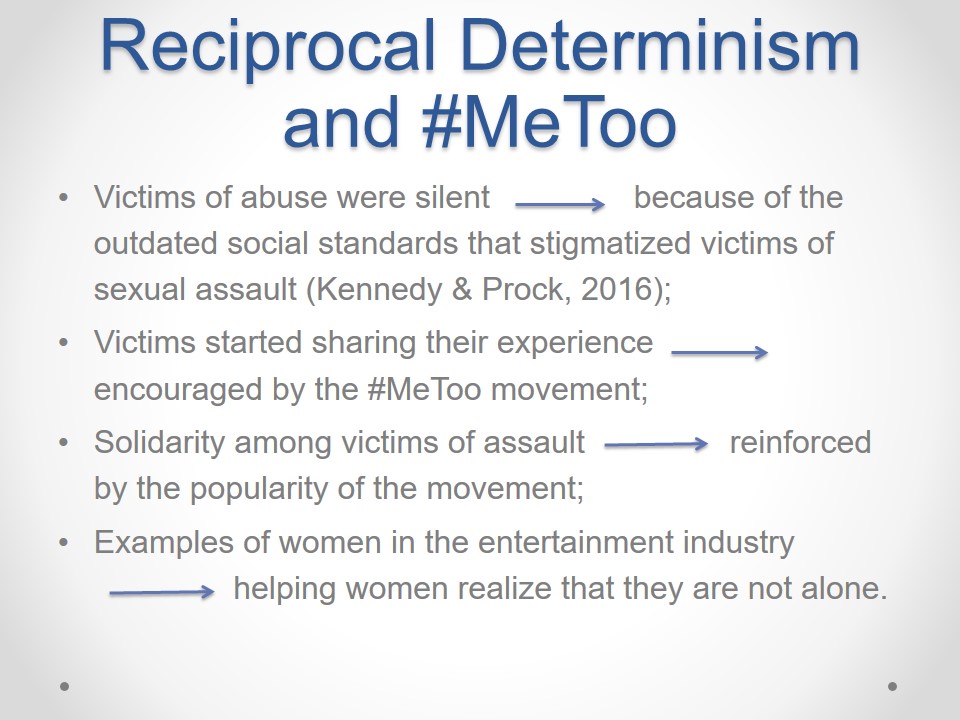
Social Psychology and #MeToo
- Sexual harassment and abuse were deeply rooted in the social interactions of the past (Richards & Haglund, 2015);
- “Narrative has been a unifying and mobilizing force throughout history” (Pazzanese & Walsh, 2017, para. 5);
- Power of narrative: telling real-life stories of abuse encourages others to share theirs;
- #MeToo provides women with safety to share their stories without being judged, unlike in the past;
- Coping mechanisms can develop more effectively in group settings.
- #MeToo opened possibilities for the societal change in terms of de-stigmatization of abuse victims;
- Guilt, shame, and fault were often associated with experiences of sexual abuse and harassment;
- No more discrediting of victims in the sphere of social justice;
- Elimination of harmful mindsets of the past:
- It was normal for women to get assaulted and harassed;
- Overcoming harmful experiences was easy (Daley & Kitson, 2017).
From the socio-psychological standpoint, the #MeToo phenomenon used the power of narrative to undermine the past perception that stories of abuse and harassment should not be brought up. Victims now feel safer than ever to express their feelings and recount their traumatizing experiences. By doing so, they are able to strengthen their coping skills and aim toward complete mental recovery.
Another important outcome of #MeToo in regards to social psychology relates to the de-stigmatization of abuse victims, which was prevalent in the twentieth century. This also ties in with reciprocal determinism: as perceptions within the society changed, victims are no longer discredited and treated respectfully. Additionally, the movement aims to eliminate the past harmful mindsets that abuse is not so problematic and can be disregarded.
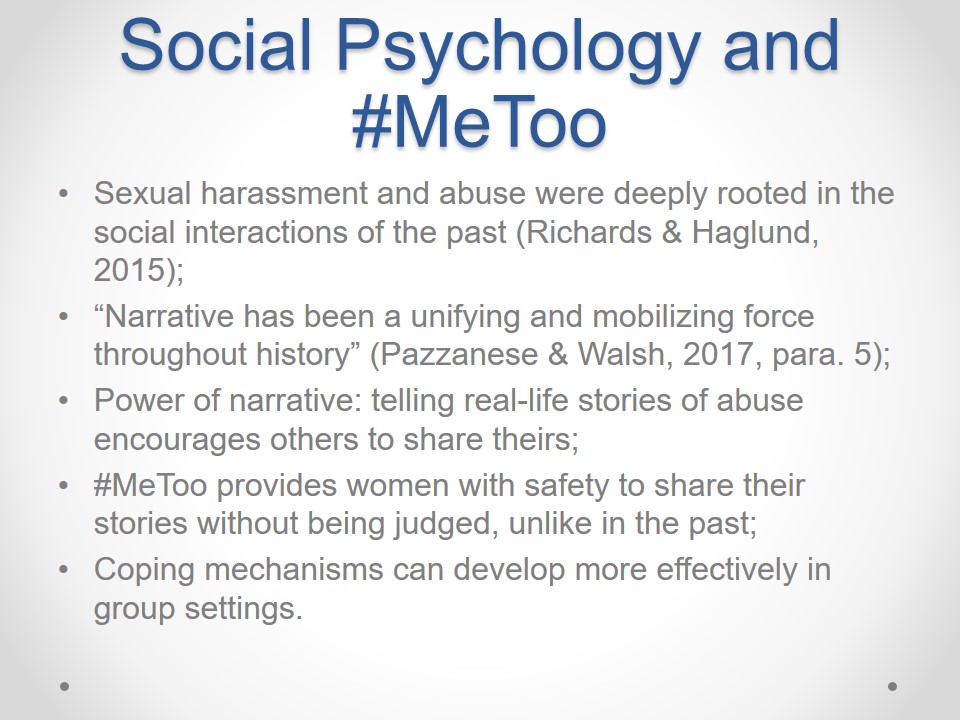
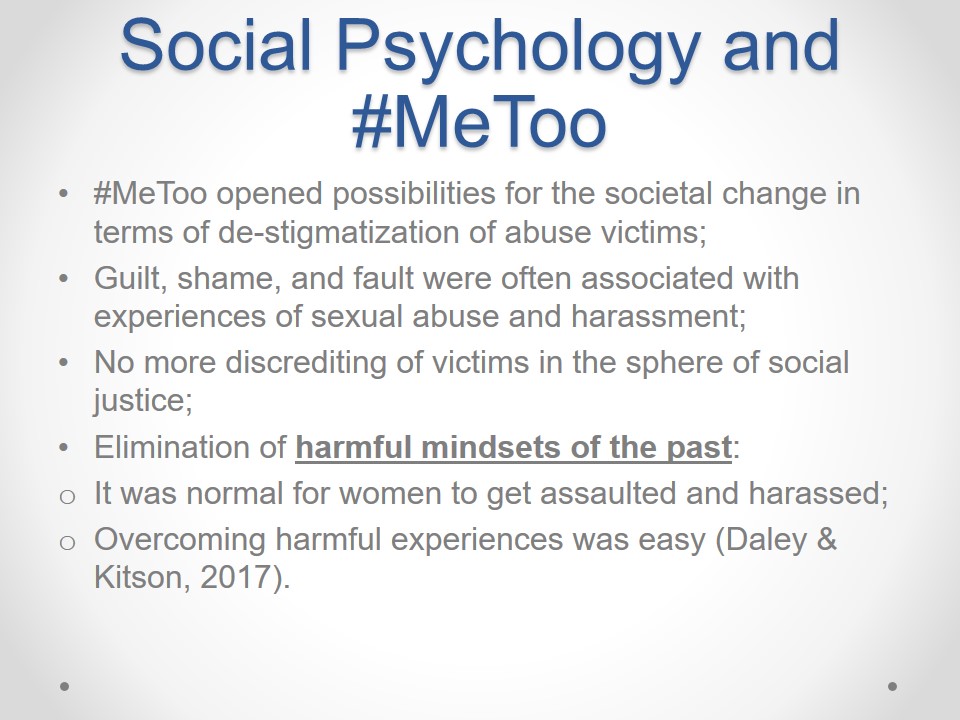
The Opposite Perspective
- #MeToo has the potential of expanding the divide between men and women (Kimmel, 2018);
- Cases when men get accused of sexual abuse without proof affect #MeToo’s credibility;
- “Guilty until proven innocent”: false accusations of sexual abuse harm people’s careers and reputations (Wells, 2015);
- The narrative of toxic masculinity started infiltrating the media, disregarding problems that innocent men deal with after #MeToo (Godwin, 2018).
Despite the positive outcomes of the movement in terms of the social justice, the adverse impact should also be discussed. It has been pointed out that the divide between men and women might expand due to the narrative of ‘toxic masculinity’ that the movement’s proponents reinforce. This is damaging to the reputation of all men, even those who have been wrongfully accused of sexual assault and harassment.
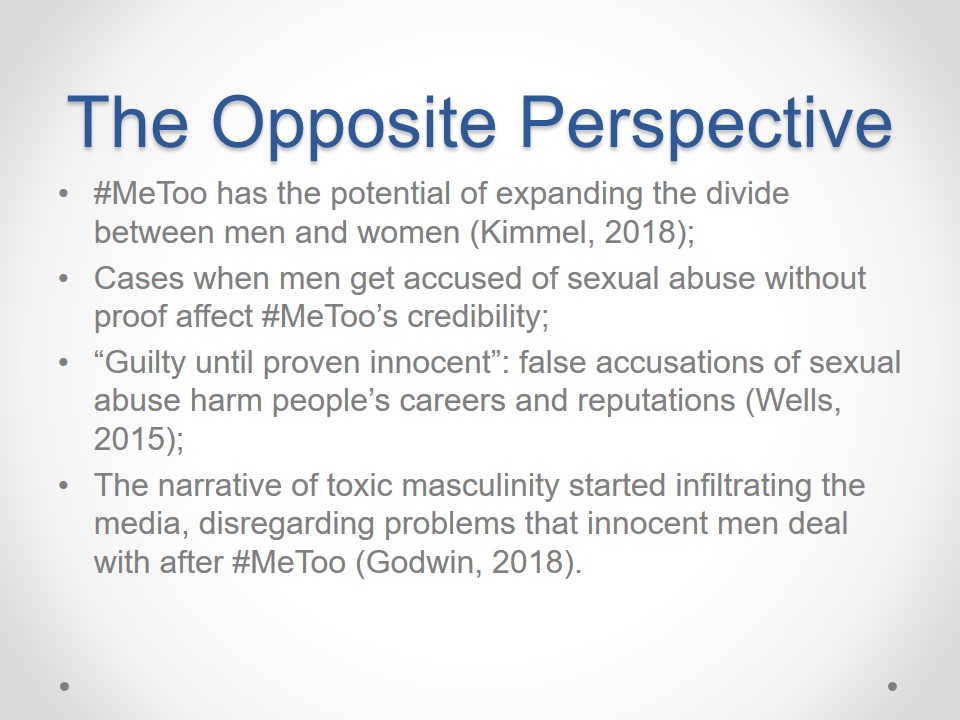
Conclusion
- #MeToo opened the boundaries to discussions about the impact of sexual abuse;
- #MeToo exposed the social structures of stigmatizing victims;
- #MeToo gave victims the power to speak up without being afraid;
- #MeToo used reciprocal determinism to affect behaviors of sexual abuse victims;
- The movement supported the narrative of toxic masculinity, which affected men adversely;
- The movement made it easier for men to get accused of sexual assault and harassment.
The #MeToo movement made a significant impact on the way the topic of sexual abuse and harassment has been treated. Victims now feel safe and empowered to share their stories because the social environment shifted in the direction of sympathy and acceptance. However, it is essential to remember that a dialogue is needed for strengthening the society rather than dividing it based on the stereotypical perceptions of sexual abuse.
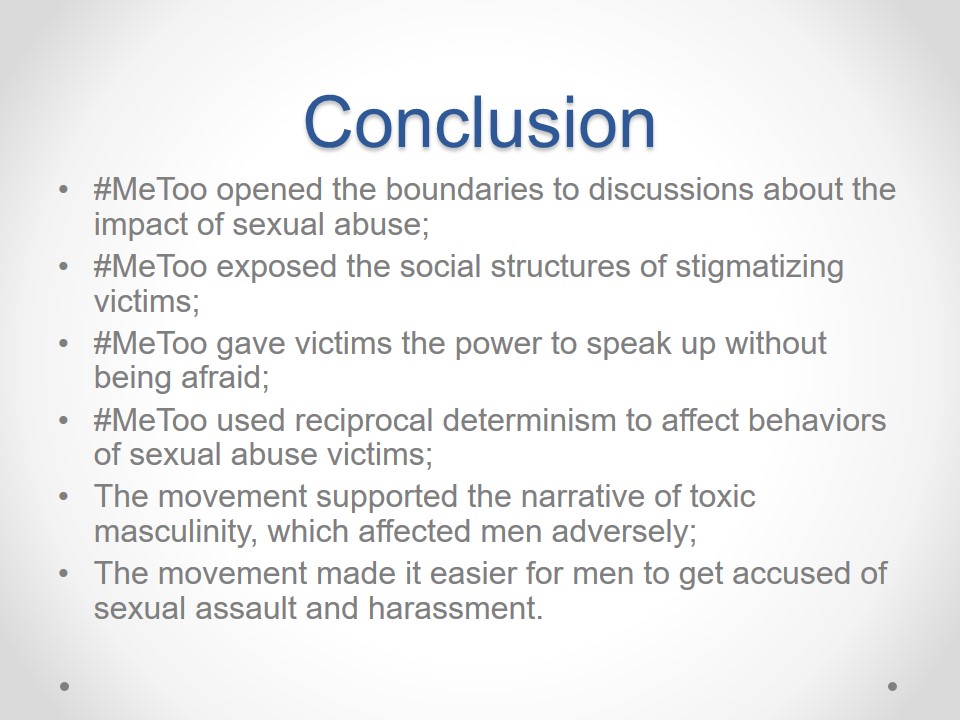
References
Daley, K., & Kitson, R. (2017). Psychologists’ reactions to the #MeToo movement. Web.
Godwin, R. (2018). Men after #MeToo: There’s a narrative that masculinity is fundamentally toxic. The Guardian. Web.
Kennedy, A., & Prock, K. (2016). “I still feel like I am not normal”: A review of the role of stigma and stigmatization among female survivors of child sexual abuse, sexual assault, and intimate partner violence. Trauma Violence Abuse, 2016, 1-16.
Kimmel, L. (2018). Is #MeToo worsening the divide between men and women?The Globe and Mail. Web.
Murray, D. (2017). Empowerment through empathy – We spoke to Tarana Burke, the woman who really started the ‘Me too’ movement. Elle. Web.
Nevid, J. S. (2013). Psychology: Concepts and applications. Belmont, CA: Cengage Learning.
Northeastern University. (2017). Psychologist discusses how the #MeToo creates solidarity for victims of sexual harassment. Web.
Pazzanese, C., & Walsh, C. (2017). #Me Too surge could change society in pivotal ways, analysts say. Web.
Richards, D., & Haglund, J. (2015). Violence against women and the law. New York, NY: Routeledge.
Wells, J. (2015). ‘Guilty until proven innocent’: Life after a false rape accusation. Telegraph. Web.